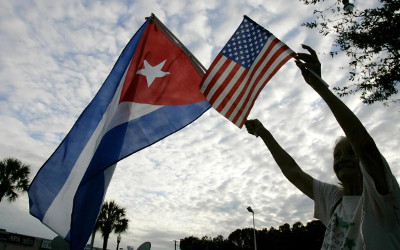AKIPRESS.COM -  As U.S. ties with Cuba grow stronger, The Kansas City Star's author Lewis Diuguid has suggested Americans to think of what they can gain from the island nation.
As U.S. ties with Cuba grow stronger, The Kansas City Star's author Lewis Diuguid has suggested Americans to think of what they can gain from the island nation.
Cuba is not just a growth market for agricultural exports from Missouri and Kansas. U.S. officials need to closely examine Cuba’s health care system and import what could work here. Miguel Angel Paneque, M.D., explained that Cuba’s focus is on prevention.
Cuba has about 80,000 doctors, and has sent medical teams around the world to help during disasters such as the earthquake in Haiti in 2010 and even offered to send hundreds of doctors and medical professionals to the U.S. in 2005 after Hurricane Katrina hit New Orleans. But the Bush administration declined the offer.
The World Health Organization lists Cuba as having 6.7 physicians per 1,000 people, the highest on the planet. The U.S. in comparison has only 2.5.
People and corporations bleed obscene profits from the U.S. healthcare system. In Cuba it’s built on maximizing human potential and doing what it can to help the 11 million people in that country. World health officials list Cuba as the world’s first country to have eliminated mother-to-child transmission of HIV and syphilis.
"Cuba’s extraordinary healthcare system was among the things my partner Bette and I learned with other professionals on a 'Cuba at a Crossroads' tour last month sponsored by the National Association for Multicultural Education. Rita M. Pereina, one of our guides for the eight days of learning in her country, walked us through a Cuban farmer’s market, explaining how it contributed to a 'food security' system, guaranteeing low-cost staples so no one goes hungry. The U.S. has a high food insecurity rate and a welfare system that labels and punishes people who are poor," remembers Diuguid.
Americans also can learn from Cuba’s green revolution. Forests that had been devastated by centuries of coffee, cattle and other agricultural production have been replanted with millions of trees. The area is home to more than 1,000 people.
In Havana, the Cuban equivalent of President John Kennedy’s 1961 promise to put a man on the moon before the decade was out at the Literacy Campaign Museum. Cuban leader Fidel Castro in a September 1960 speech at the United Nations announced a massive campaign to eliminate illiteracy by the end of 1961.
History professor and museum director Luisa Campos Gallardo explained that thousands of volunteers as young as age 10 were recruited with the consent of their parents. Many were ages 14 to 16, and 52 percent were girls. People were inspired by the Cuban revolution.
They were trained, given material and sent into the countryside to teach reading and writing. People who needed glasses received them after eye exams.
Some volunteers were killed by counter revolutionaries, Gallardo said. But on December 1961, a flag was raised in the communist country, declaring Cuba to be free of illiteracy.
The illiteracy rate had been more than 20 percent. In the U.S. 14 percent, or 32 million, adults can’t read, and 19 percent of high school graduates can’t read.
To be declared literate, Cubans had to prove that they could read, and then write a letter to Castro. The museum has those letters, including records of the volunteers.
Gallardo said the oldest Cuban to learn to read and write was 106. One person in a letter thanking Castro wrote that until he learned to read and write, he never felt Cuban and didn’t have an identity. United Nations Educational, Scientific and Cultural Organization validated the results. Gallardo said some of her university colleagues learned to read and write in the campaign and became college professors.
Cuba sent volunteers to many Third World countries, teaching millions of people to read and write, Gallardo said.
"The U.S. can learn from that. Just imagine all 320 million people in this country being able to read and write like 99.8 percent of Cuba’s population today," Lewis Diuguid concluded.
